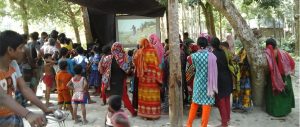Campaign for Healthy Rice Uses Video as a Medium to Extend Reach

DHAKA, Bangladesh (CSISA) – The Cereal Systems Initiative for South Asia (CSISA), in collaboration with the Agricultural Advisory Society (AAS), is scaling out a campaign in Bangladesh to increase farmers’ knowledge and skills on quality rice seedling production.
Reaching the vast number of individuals of rural Bangladesh’s huge farmer population presents a formidable challenge to the agricultural extension system’s capacity. The diversity and geographic spread of Bangladesh’s farmers also challenge extensions’ ability to link farmers with innovative and locally relevant agricultural research findings.
CSISA has launched a partnership with the AAS, an NGO, to help disseminate agricultural research and extension messages to large numbers of farming villages, highlighting locally relevant sustainable intensification technologies.
In 2012, CSISA and AAS teamed up to field test an initiative to use videos to spread agricultural information. CSISA and AAS organised 482 screenings of the Bangla language video ‘Save more, grow more, earn more,’ which introduces farmers to small-scale agricultural machinery that can be attached to two-wheeled tractors. These implements seed and fertilize crops in a way that saves fuel and labour, allowing farmers to profit while reducing irrigation requirements.
Groups of volunteers in over 300 communities distributed over 3,000 DVDs across Bangladesh and the video aired 12 times on the national station, Bangladesh Television, which resulted in a viewership of 28 million.
The initiative was so successful that it earned the prestigious international Access Agriculture Award for the use of training videos for farmer outreach in 2015.
Based on this experience, CSISA and AAS worked together this year to use video shows to increase farmers’ knowledge and skills on quality rice seedling production. The team screened ‘Healthy Rice Seedlings’ in 11 districts within Southern Bangladesh during May-July, reaching an audience of at least 23,970 people.
“Video-based material is very important for agricultural extension,” said Rezaul Karim Siddique, the director of this video production. “[Videos] create awareness among farmers about new technologies, disseminate scientific knowledge to marginalized people and areas, and can reduce knowledge gaps in agricultural production.”
Now, over 205,000 farmers have seen CSISA-related videos in the target area in Bangladesh.
The Cereal Systems Initiative for South Asia is led by the International Maize and Wheat Improvement Center and implemented jointly with the International Food Policy Research Institute and the International Rice Research Institute.
